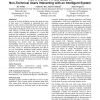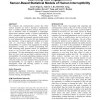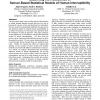13 search results - page 2 / 3 » Using mental load for managing interruptions in physiologica... |
CHI
2007
ACM
14 years 5 months ago
2007
ACM
In order to develop intelligent systems that attain the trust of their users, it is important to understand how users perceive such systems and develop those perceptions over time...
HUC
2010
Springer
13 years 5 months ago
2010
Springer
With a focus on presenting information at the right time, the ubicomp community can benefit greatly from learning the most salient human measures of cognitive load. Cognitive load...
CHI
2005
ACM
14 years 5 months ago
2005
ACM
The computer and communication systems that office workers currently use tend to interrupt at inappropriate times or unduly demand attention because they have no way to determine ...
CHI
2004
ACM
14 years 5 months ago
2004
ACM
Current systems often create socially awkward interruptions or unduly demand attention because they have no way of knowing if a person is busy and should not be interrupted. Previ...
CSCW
2004
ACM
13 years 10 months ago
2004
ACM
The growing use of Instant Messaging for social and work-related communication has created a situation where incoming messages often become a distraction to users while they are p...



